Trigger warning: this post discusses anxiety, depression, suicidal ideation, and eating disorders. Also, I am not a vet, behaviorist, trainer, or mental health professional. This post merely reflects my personal journey as I remember it.
There has been a lot of buzz in the media recently about mental health, with multiple high-profile suicides in recent days. In the following hours, several of my pet blogging friends posted their own stories in an attempt to bring eyes to an important topic and to make it easier for others to speak up if they need help.
I thought — we’re bloggers! Let’s do what we do best: spread the word about things that need to be discussed. Several of us are speaking out about our own mental health struggles or about mental health in general. Their posts will be linked up at the end, but in the meantime, I have a story to tell.
My Dog Takes Anti-Anxiety Meds — And So Do I
Henry and I are both on SSRI’s, otherwise known as selective serotonin reuptake inhibitors. You might know them by their generic or brand names:
- Citalopram (Celexa)
- Escitalopram (Lexapro)
- Fluoxetine (Prozac)
- Paroxetine (Paxil, Pexeva)
- Sertraline (Zoloft)
- Vilazodone (Viibryd)
SSRIs work by increasing the neurotransmitter serotonin in the brain and are prescribed for both depression and anxiety disorders. Enough of these dry facts, though — this post is really about feelings. Henry and I both suffer from some form of anxiety, and we’ve both benefitted from medication.
My Story
Full warning: I’m about to get personal. Why am I doing this? If someone — just one person — reads this and decides to get help, it’s totally worth it.
High School
I was always a sensitive kid, but it was in high school that I started to sense that I might have been a little more than just hormonal. If I got into a fight with my mom or just felt generally rattled, I would sit on the floor in my closet and sob into the dark. I battled an eating disorder that, while never officially diagnosed, caused my weight to yo-yo and my period to disappear for months at a time. I convinced myself everything was fine, that I was just a normal teenager — and, for the most part, I was. I kept myself busy with painting classes, my school’s theater program, and homework, and eventually graduated in the top 5% of my class.
There was always a nagging voice, though: people didn’t actually want to spend time with me. People just tolerated me. If I gained weight, I wouldn’t ever be perfect. No one would ever date me. I would be a failure.
College
For my first few college years, I thrived. I was regularly working out, making friends, and studying subjects that I loved. I won awards and finally succeeded in wooing a few gentlemen. Things were going well and I was excited for my future — until senior year.
Almost halfway through senior year, my boyfriend of a year and a half broke up with me out of the blue. The boyfriend that I intended to live with after graduation, who would help me navigate the scary post-graduation minefield of job hunts and adult apartments. I had absolutely amazing friends, and we had a lot of fun going out to the campus bars and doing ridiculous things that I would have never done if I had still been in my boring relationship. I have countless priceless memories from that period — but I still cried in my bed almost every night for months. Don’t get me started on the insomnia.

My friends noticed. They came close to saying something to me. When I finally announced that I was going to make an appointment with one of the student health services counselors, they breathed a collective sigh of relief and told me how glad they were.
I think I went to two sessions. The psychiatrist taught me how to meditate, and mentioned that we might want to try some medication. I didn’t have the patience to meditate (oh, but I tried!) and I had no interest in meds. I wanted solutions, but was not interested in the options. I stopped making appointments.
The end of my senior year passed with more parties, an internship offer for a design position in New York City, and a valedictorian speech. Obviously, I was “fine”: I was kicking butt, and I had a plan. I didn’t need a guy to live with — I was striking out on my own in the Big Apple.
I was “doing great” — but I still cried. A lot.
New York: The Early Years
For my first year in New York, I lived in a two-bedroom East Williamsburg apartment with six other people. Yes, you read that right. I made $25 a day at my internship, then, once I scored a full-time position, barely enough to cover rent and groceries.
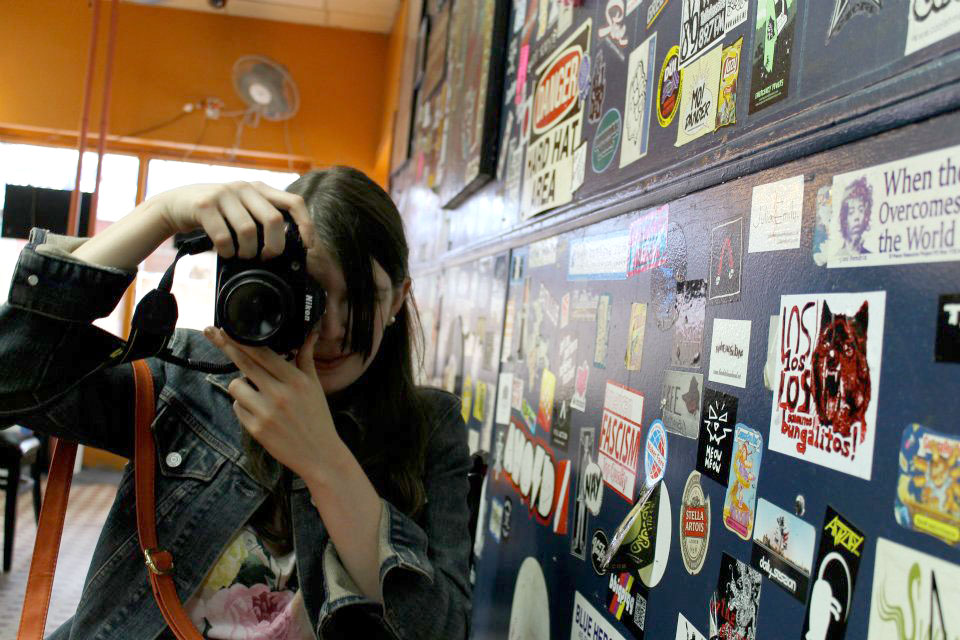
One of my — shall we say — poor dating choices from college moved to New York as well, and we carried on our non-dating, completely unlike-me “relationship” for several more months. Neither of us was any good at communicating anything, and that whole situation imploded spectacularly.
I vividly remember one evening, sitting in Poor Dating Choice’s parked van while he ran a box up to his apartment, thinking that it would almost be nice to just open the door and fall into the street in front of an oncoming car. “Suicidal ideation” — that was what my college psychiatrist had called it. Not acting on it, just thinking about it.
And guess what? The insomia was back.
The Turning Point
Part of the reason that I’m writing this post is that it was a friend who finally encouraged me to get help. Sure, I’d had friends who expressed concerns, but this time was different: this friend knew exactly what I was going through.
This friend also had anxiety and had been using SSRIs prescribed by his psychiatrist to manage it. He saw a lot of himself in me and encouraged me to make an appointment. I put it off for months — I was too busy, my health insurance didn’t cover enough, I was fine — and told myself I could handle it despite all indications contrary. In the process, I changed jobs and the transition amped my anxiety to a new level.
Eventually, after an acquaintance died by suicide, I remembered my friend’s encouragement as well as his success with his treatment. I made an appointment.
In Fall 2013, after two years of day-to-day struggle and convincing myself that I was fine, I finally walked into a psychiatrist’s office with the intention of trying medication.

A New Chapter
The first night, I hallucinated that my sheets were crawling and my bedroom windows dancing. I knew the meds were doing something — I just didn’t know what. A few days later, I was standing on the subway and felt myself start to spin into my usual mental spiral. Until that point, I had almost no control over my anxious thoughts. My mind would light on the triggering subject, and would tumble from anxious thought to anxious thought until I could barely pull myself out.
This day, though, was different: my brain flashed to the anxiety trigger, then stopped. I paused — what had just happened? I wasn’t falling down the pit. My brain had actually caught itself.
It was at that moment that I became a convert. Yes, my brain was different, and it benefitted from a little extra help. I started sleeping better. I started rationalizing myself out of the pits. The medication made it possible for me to stop, realize I was about to tumble, and grab a firmer foothold.
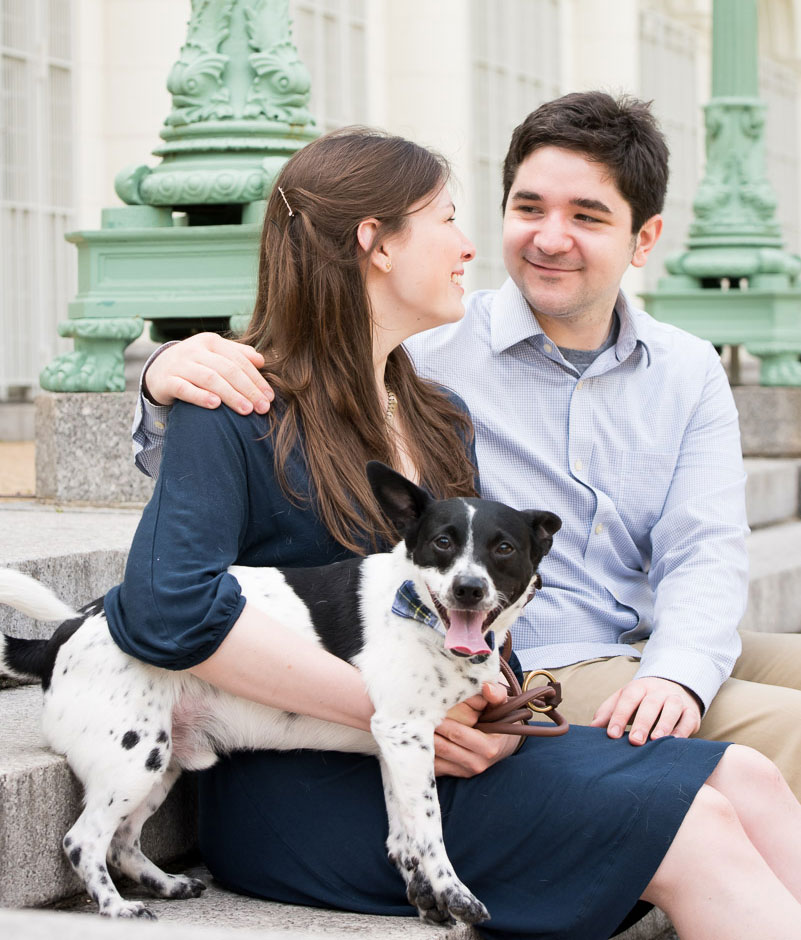
Today
As you might know, this story has a happy ending. I moved into my own studio apartment, met the love of my life, and adopted Henry. All three of us moved to Providence and will become an official family when the two humans get married next year. I’ve been on my daily 10MG of Celexa for almost five years, and I’ve found a balance in my life that I never expected. Sure, I still have ups and downs and the occasional sleepless night, but my mental health is so much better than it used to be and my life is, frankly, amazing. I feel free.
Will things stay this good forever? Maybe not. I already feel wedding planning triggering the ol’ body image issues. Maybe I’ll wean off the medication in an attempt to get pregnant and the hormones will stir things up. Maybe it will simply stop working as well. Maybe my highs and lows will get higher and lower. These are all possibilities, but I feel confident that I can handle them.
The good news? I’m not anxiously worrying about each of those possibilities.
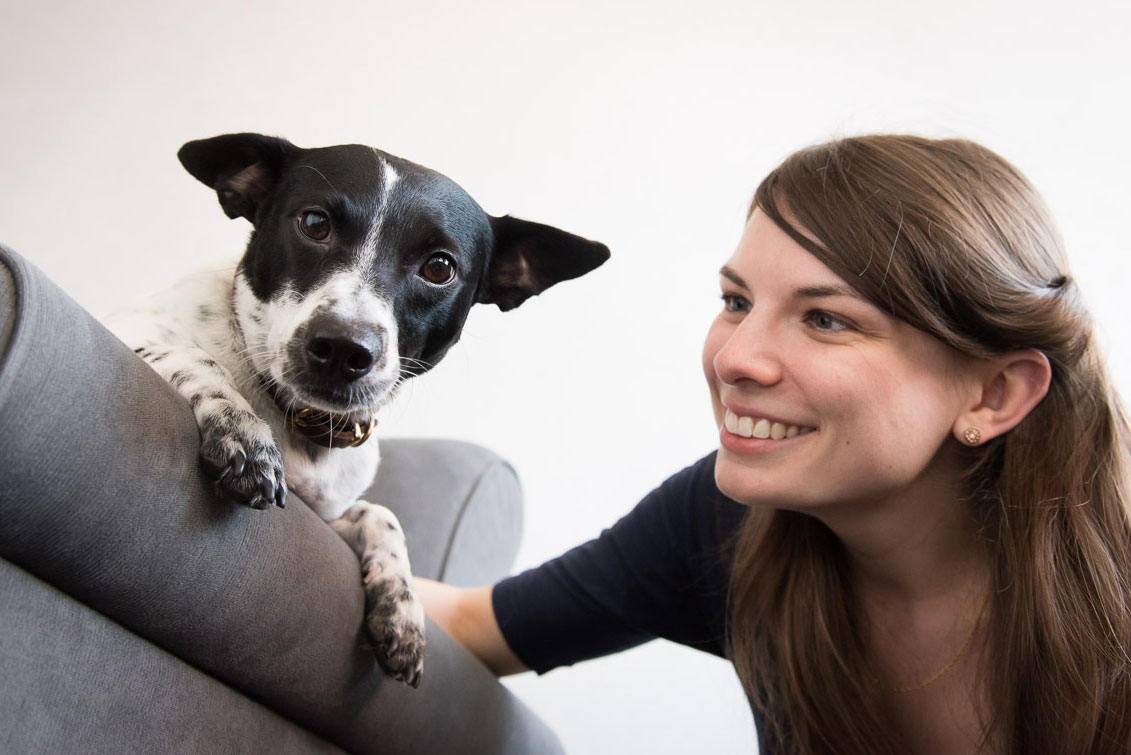
Henry’s Story
If you don’t know Henry’s backstory, I won’t bore you — just head over to our About Page to catch up.
Henry has always been an anxious boy. In no particular order, a list of things that have triggered Henry are:
- Having his paws touched
- Being left alone
- Riding on the subway
- Other dogs
- Special treats that require his protection
- The occasional bearded man
- The smell of cigarette smoke
- Riding in the car
- Water (in the bath, in small pools, and in a lake)
When I brought Henry to the vet to discuss his separation anxiety, the vet started to recommend a medication like Prozac.
“It’s helped a lot of people,” he said. “It can help dogs, too. Some people look down on it, but it can really make a difference.”
“You don’t need to convince me,” I said. “I know!”
With a reactive and anxious dog, counterconditioning can be your best friend. (Mind you, I’m not a trainer. I’m simply discussing tactics that have helped with our personal situation). Prozac helped prolong the period between the trigger and the reaction, allowing me to sneak in with some positive reinforcement.
For example: We often see dogs on our walks. Henry used to see a dog and immediately launch into a barkfest with no pause in between. He would see the trigger and immediately react. On the Prozac, there is often an extra beat in between. I can see him contemplating, even for half a second, whether or not the other dog is worth barking at. This beat can be truly invaluable.
Henry seems calmer overall, too: he lets us touch his feet and he absolutely adores belly scratches. Both of those areas used to be completely off-limits. His groomer even called him a “sweetheart” after his last nail trim! With Prozac’s help, we’ve been able to show him that the world doesn’t have to be so scary.
We Help Each Other
When it comes down to it, Henry and I are a really excellent match. Because we’ve both dealt with anxiety, we can help each other. While someone who has never dealt with mental health issues might lose patience with Henry’s barking fits and anxious trembles, I can comfort and support him from a place of understanding. Likewise, if I have a down, off, or anxious day, Henry is the absolute best snuggler and listener.
I feel honored that the two of us can band together to be a voice for both human and canine mental health.
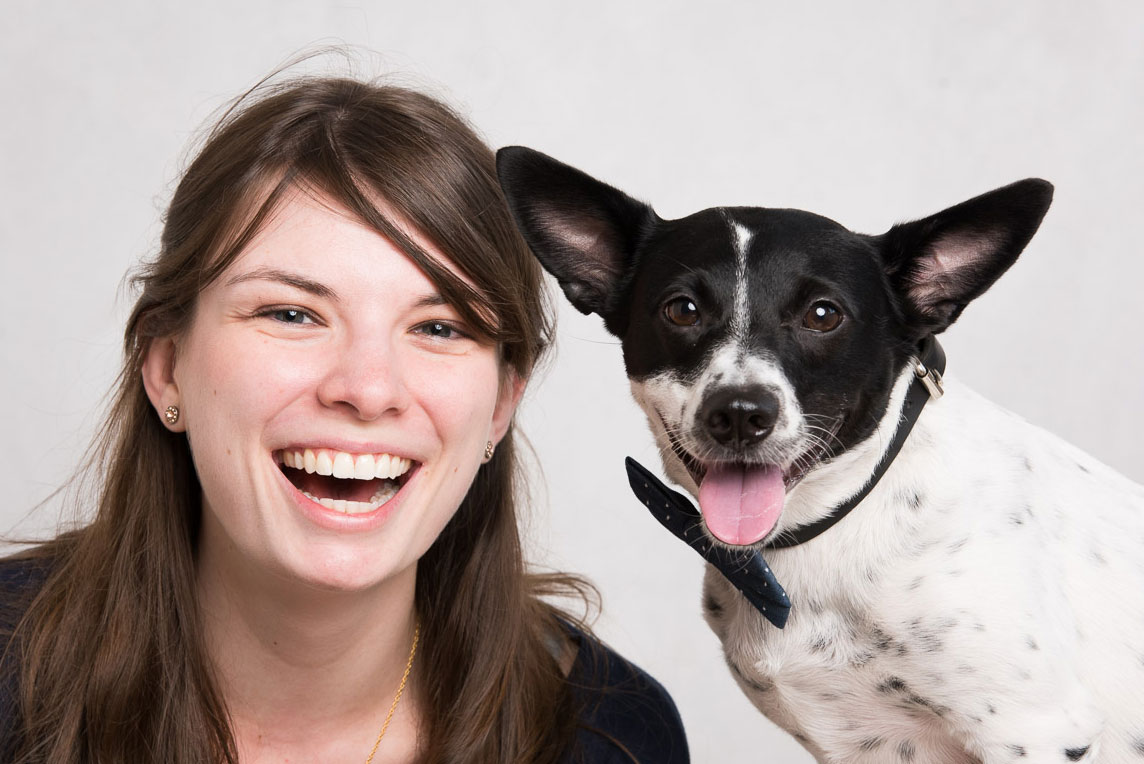
Can an SSRI Help You or Your Dog?
If you think an SSRI like Prozac could help your dog, talk to your vet. Many veterinarians can dispense it right from their offices, or you can take a prescription to your local pharmacy. (Henry has his own prescription savings plan at Walgreens!)
If you are struggling with your own mental health, please remember that you are loved. It took a friend who knew exactly what I was going through to get me over that hump. If you can relate to my story, consider me that friend for you. I thought I was “fine” for two years — and those were two years I will never get back. It may seem scary to make that first appointment, but you are worth it.
If you are interested in therapy but don’t have the time or insurance, you can consider a service like Talkspace. It has been so helpful for me. I was paying about $30 a week and could text my therapist every day, even on my lunch breaks. It was so easy! I even requested a therapist who had a dog! I paused my plan after I started feeling better about the issue at hand, but I can have the same therapist when I go back. If you use my referral link, we’ll both get $50 off our next month. This is seriously not an ad — I just happen to have a referral link as a member — and this service genuinely helped me when I kept coming up with any excuse not to return to therapy.
If you are feeling suicidal, you can call the National Suicide Prevention Hotline at: 1-800-273-8255
To Good Mental Health!
Good mental health can be a lifelong journey, and Henry and I wish you all the best! You are not alone, and you deserve to feel free and happy. We love you!
Check out our blogging friends’ posts:

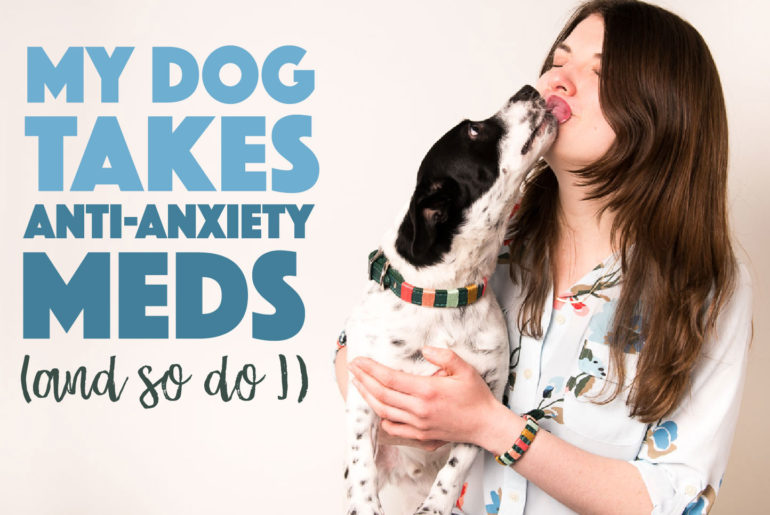

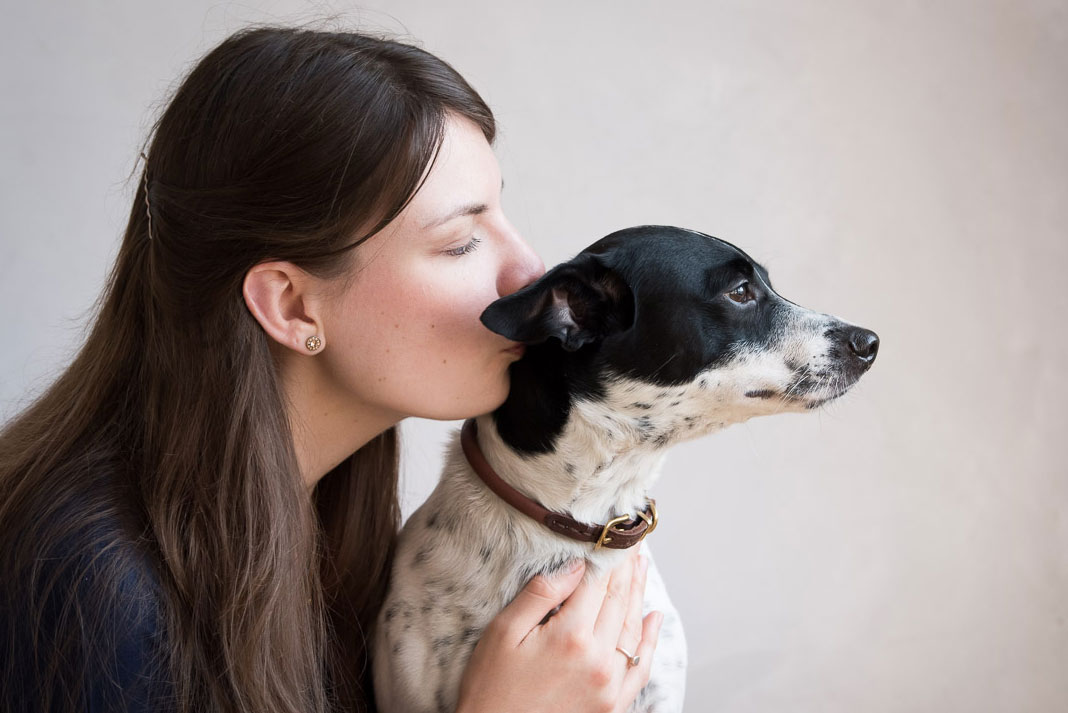




6 Comments
I think a lot of people are like you, they think they are fine but they aren’t always. They may not even realise how under stress they are and what triggers bouts of anxiety. After Dash was killed I spent three years struggling back to the point I didn’t collapse from the weight of anxiety, and then the tears when a cat I knew online passed away.These things take time but they can be resolved. People being open is a game changer for so many.
Henry is great, he has the best and most courageous Mom. You are both an inspiration and I have no doubt will encourage people to take that critical step towards better mental health.
Thank you, Marjorie! I hope you’re doing well now ❤️
Your post gave me chills! Thank you for sharing your personal story. Like you, I am thriving on an SSRI, although I still have my moments of struggle. I’ve been on Lexapro and it’s great. I’m so glad that you’ve found your way and that you’re happy!
Aw, thank you! ❤️ I’m so glad we’ve both found ways to make it work, even if the road is sometimes still tough. Hugs to you and Wynston!
Rochelle, thank you for sharing such a personal story. I have tears as I hear all the things you went through. You are a perfect example of how “being the valedictorian” /”job promotions” etc do not mean your child or you are “fine”. The fact that you and Henry found each other and are thriving is wonderful! I also love the virtual counselor. I plan to share it and use it. Thank you brave friend!
Pingback: What Would You Confess? ~ The Timid Rider